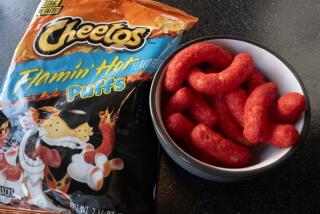She’s Getting the Skinny on Food Labeling
- Share via
NEW YORK — When Meredith Berkman’s 2-year-old daughter chanted, “Booty! Booty!” for breakfast, the New York mom often gave in.
After all, the package of the toddler’s favorite snack, Pirate’s Booty, declared it was “Good for you!” The nutritional panel claimed the rice puffs contained very little fat--and even a few vitamins.
But it was wrong.
Last December, an astute Good Housekeeping Institute staffer who thought it was all too good to be true tested the booty and blew the whistle. It seems the rice puffs were not manna for moms but ordinary junk food in disguise, containing as much fat as a bag of corn chips--and more than three times the amount advertised.
In April, Berkman launched a $50-million, class-action lawsuit claiming “emotional distress” and nutritional damage. Jay Leno mocked the suit on his show, saying: “Here’s a tip: If the snack you’re eating contains the word ‘booty,’ you’re probably not going to be losing much weight.”
Berkman, a fit and fashionable 37-year-old writer and mother of two, didn’t mean to become the Erin Brockovich of low-fat food. But she found herself butting into strangers’ conversations about the lawsuit to explain that, really, it was the principle of the thing.
“The specifics of this case are about the fat, but the larger context is truth in labeling,” she said. “I don’t want their money--any rewards will go to charity. I just want them to be accountable.”
The lawyer, Berkman’s brother-in-law, assumed a New York-ironic tone when he wrote the complaint, noting that Berkman represents all consumers who ruined their diets, had to spend more time at the gym and fattened up their kids while thinking they were actually cutting calories. She realizes the whole thing can sound absurd. “I feel like I’m in the ‘Seinfeld’ episode about the yogurt shop that made everybody fat because it was really selling high-calorie ice cream,” she said. “My husband paces the apartment, muttering that he’s so glad I kept my own last name.”
But the issue, she emphasized, is quite serious: a misleading label can be a matter of life and death for people with food allergies.
The Food and Drug Administration agrees. While it doesn’t verify every company’s nutritional panel information, it does issue mandatory guidelines to safeguard consumers’ health. And it wasn’t the first time the maker of Pirate’s Booty, Robert’s American Gourmet Foods Inc., was caught mislabeling products.
In January 2000, the FDA warned the company for asserting that its Fruity Booty was mostly fruit, when in fact the rice and corn puffs contained very little. It also was reprimanded for making health claims for echinacea, gingko biloba, St. John’s Wort and spirulina in other snacks. Robert’s withdrew or amended the products, although a spokesman said the changes weren’t prompted by the FDA.
Robert’s snack line, however, continued to grow in popularity because of its purported low-fat content. Weight Watchers’ members traded notes on Internet chat rooms, health clubs sold the rice puffs as diet food and in New York nearly every stroller seemed to have a package of “booty” in the basket. Pirate’s Booty even made Vanity Fair’s “in” list.
In December, Delia Hammock, Good Housekeeping’s director of nutrition, decided to have the snack her colleagues kept raving about tested. “It didn’t taste low-fat to me,” she said, “and when it tastes too good to be true, it usually is.”
At an independent laboratory, chemists ground up samples, bathed them in acid until only the soluble fat was left, then dried and weighed the fat. They found 8 grams of fat and 147 calories--a far cry from the 2.5 grams of fat and 128 calories the package claimed.
Another lab found that Veggie Booty, a high-in-vitamin spinach and kale coated rice puff that was a favorite among moms whose kids wouldn’t eat their greens, had 10 grams of fat--the same as a candy bar.
After Hammock confronted Robert’s, the company issued a recall in January and explained on its Web site that new machinery had necessitated a change in the recipe. A company spokesman, Griffin Douglas, refused to comment on the label’s discrepancy, saying only, “There’s no explanation.”
The nutrition panel now shows Pirate’s Booty has 5 grams of fat. A follow-up test showed it was closer to 6 grams, said Ron Schnitzer at Sani-Pure Labs in New Jersey. “It’s a little closer, but they still don’t have it right.” The FDA allows a 20% variation.
The new label surprises some folks who thought they had finally found a guilt-free snack food. “I would give Veggie Booty to my daughter when she didn’t eat her vegetables. The label said it had all those vitamins,” Susanna Jacobs said while watching her 3-year-old at a Central Park playground. “I might as well have been giving her Haagen-Dazs for dinner. I feel deceived.”
In the meantime, Berkman tolerates the jokes about her “booty” fetish, saying it’s worth it if it brings consumers closer to knowing that what they see on labels is not always really what they get.
“Americans assume that someone is watching, that the companies’ claims are policed carefully,” said Berkman. “Well, the FDA is overburdened. This lawsuit is our message to the company.”
More to Read
Eat your way across L.A.
Get our weekly Tasting Notes newsletter for reviews, news and more.
You may occasionally receive promotional content from the Los Angeles Times.









